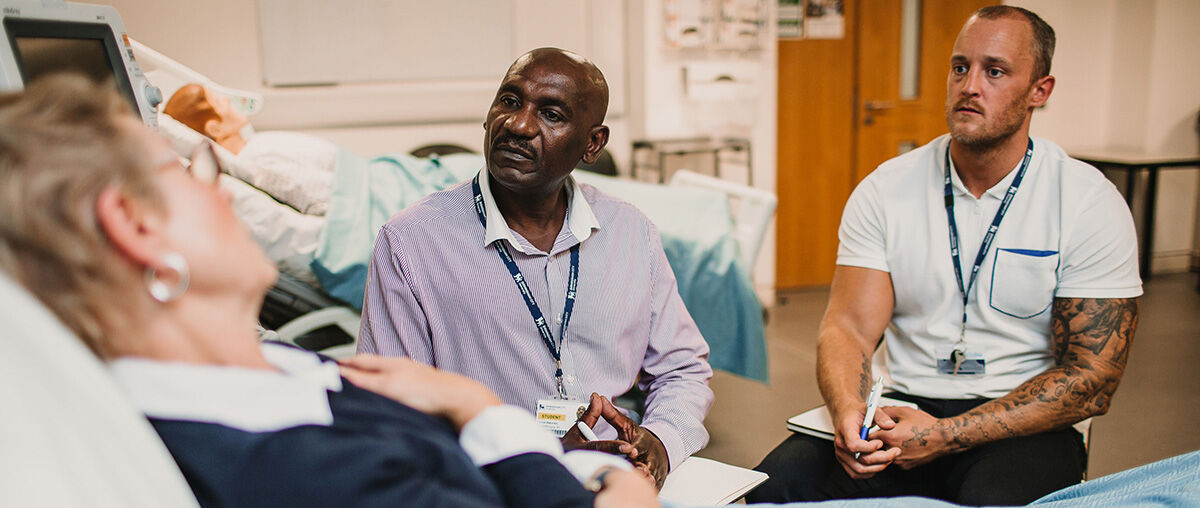
Master of Education – Leadership in Learning (Teach First) - MA
Currently viewing course to start in 2026/27 Entry.
The Masters award is available to ambassadors of the Teach First Leadership Development Programme (LDP). The LDP is a leadership programme, facilitated by Teach First colleagues that runs alongside the PGDE, which Teach First Participants engage with during their initial 2 years of practice....
- Level Postgraduate Taught
- Study mode Part Time
- Award MA
- Start date September 2026
- Fees View course fees
- Subject
- Location Online Learning
This course is:
Overview
The Masters award is available to ambassadors of the Teach First Leadership Development Programme (LDP). The LDP is a leadership programme, facilitated by Teach First colleagues that runs alongside the PGDE, which Teach First Participants engage with during their initial 2 years of practice. The award is open to all participants who have completed the Teach First PGDE and includes two full academic years of teaching in a Teach First partner school. The Masters content builds on the structure and content of the LDP and the PGDE.
What's covered in this course?
The Professional Practice Enquiry module is the culmination of your Masters in Leadership in Learning. It provides you with the opportunity to develop a systematic understanding of research, national and international frameworks, and practical knowledge in relation to your chosen area, and to develop your professional practice. You are encouraged to use self-direction and originality in pursuing your development focus through professional enquiry. The module provides you with opportunities to: act autonomously in designing and planning a master’s level, practice-based enquiry; to investigate the relationships between theoretical, practical and research knowledge and to consider the actual and potential impact on practice.
Why Choose Us?
The modules provides students with opportunities to:
- Act autonomously in relation to the selected leadership focus/aim
- Investigate the relationships between theoretical, practical and research knowledge
- Consider the actual and potential impact on practice
- Disseminate findings in a leadership context
- 1-2-1 supervisor for dissertation – advice and support
Entry Requirements
Essential requirements
The Masters award is available to Teach First ambassadors of the LDP (The LDP is the Leadership Development Programme).
A pass is required from the Teach First PGDE.
If you have a qualification that is not listed, please contact us.
Fees & How to Apply
UK students
Annual and modular tuition fees shown are applicable to the first year of study. The University reserves the right to increase fees for subsequent years of study in line with increases in inflation (capped at 5%) or to reflect changes in Government funding policies or changes agreed by Parliament. View fees for continuing students.
Award: MA
Starting: Sep 2026
- Mode
- Duration
- Fees
- Part Time
- 1 year
- Show fees
- £900 per 20 credits
- Year 1 - 60 credits
Fees for Part-time students
This course can be studied on a Part-time study basis. The cost per year of study is based on credit requirements for that year.
International students
Sorry, this course is not available to International students.
Application deadlines
We advise you to apply early to allow sufficient time for you to prepare to start your studies in September. Please apply by Friday 17 July to allow time to arrange accommodation, student finance and visas where required.
Late applications will be accepted where places are still available.
To find out more, see our application timeline.
Personal statement
You’ll need to submit a personal statement as part of your application for this course. This will need to highlight your passion for postgraduate study – and your chosen course – as well as your personal skills and experience, academic success, and any other factors that will support your application for further study.
If you are applying for a stand alone module, please include the title of the module you want to study in your Personal Statement.
Not sure what to include? We’re here to help – take a look at our top tips for writing personal statements and download our free postgraduate personal statement guide for further advice and examples from real students.
Course in Depth
Level 7
In order to complete this course a student must successfully complete all the following CORE modules (totalling 60 credits):
The Professional Practice Enquiry module is the culmination of your Masters in Leadership in Learning. It provides you with the opportunity to develop a systematic understanding of research, national and international frameworks, and practical knowledge in relation to your chosen area, and to develop your professional practice.
Download course specification
Download nowHow you'll learn
The course is Part-time and is assessed via coursework. There is a total of 600 hours study time directed and independent.
The Masters module – Leadership in Learning aims to address:
- The role of research, scholarly activity and evidence-based practice as an important part of professional development
- Current issues, initiatives and developments in education and educational practice aimed at extending skills, knowledge and understanding in your subject/ phase area
- Principles that underpin and inform practice-based enquiry approaches to educational research
- Research methodologies and ethical considerations in relation to appropriateness, effectiveness, and resource implications of enquiry
- Knowledge, skills and techniques in research methods and approaches appropriate to the professional workplace
Employability
Career Development
Your chosen development focus for the module will be based on personal, professional and subject/ phase priorities. It may build on work carried out in earlier modules, or address an entirely different or new aspect of professional practice. The expectation is that this work is underpinned by a leadership focus, which will demonstrate your skills as a leader and your ability to demonstrate impact in terms of the Fair Education Impact
Facilities & Staff
Our facilities
Our School of Education and Social Work is based at our City South campus in leafy Edgbaston.
We’ve spent £41million expanding the education facilities at City South. These facilities offer hands-on practical experience, replicating the spaces you will come across in professional practice. Alongside classrooms and lecture theatres, we also have a range of specialist teaching and learning spaces for specific subjects including science, design and technology, drama and physical education.
As well as subject-specific rooms, our facilities include the Primary Innovation Lab, which houses £24,000 worth of LEGO. This room is a special resource for our education students, offering an innovative and creative way to approach subjects across the curriculum – from computing to English, mathematics to art. The lab responds to research that children and young people learn best from practical experience.
Our Social Work students have access to a home environment room and mock hospital wards which offer an opportunity to gain experience of working with service users in different situations.

Computer facilities
The Seacole building has two open-access IT Suites which offer PCs, printers, photocopiers and scanners. There is also an IT Helpdesk for quick and easy help with your computing or internet issues.
Our PCs utilise the latest Intel i5 core technology, all with:
- Fast (unrestricted) internet connectivity
- Ability to save files to USB, DVD & CD
- Microsoft Office software
- Research and statistical software
- Storage space which can be accessed from any PC across the University and from home
Our PCs are also designed to support students who may have difficulties with reading and writing, featuring specialised software with zooming/magnification and screen reading capabilities, which may also be customised for individual student needs.
In addition to desktop PCs, we also offer a laptop loan facility, allowing students to borrow a laptop for up to six hours while on campus.
Our staff
Neil Sheasby
Teach First Master's Course Leader, Master's in Learning and Teaching Tutor, and Deputy Chair Ethics
Neil has worked at Birmingham City University since 2014, after leaving the Open University. He is currently the Course Leader for the Teach First Master's (Leadership in Learning) that builds on the structure and content of the LDP and the PGDE. Additional roles include delivering on the Master's in Learning and Teaching. He is also a...
More about Neil
